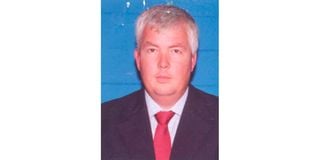Document examiner defends Kenyan-British lawyer against forgery claims

Lawyer Guy Spencer who is facing allegations of forging the signature of his rich client, who died 10 years ago.
A document forensic examiner has defended Kenyan-British lawyer Guy Spencer Elms against allegations that he forged the signature of his rich client, who died 10 years ago, so as to sell two parcels of land valued at a combined Sh500 million.
The examiner, Jacob Oduor, told a court that upon examining various known signatures of the lawyer’s client, Roger Bryan Robson, he found that there was no forgery.
Mr Robson, a British tycoon, died in 2012 and left behind the two parcels of land that are at the centre of a court dispute between city businesswoman Agnes Kagure and lawyer Mr Elms, who was Robson’s advocate.
Testifying in the High Court in Nairobi in a case involving claims that the lawyer forged Mr Robson’s signature on a will, the examiner said Mr Elms did not commit any forgery.
At the centre of the court dispute is ownership of the two parcels of land located in Karen and Upper Hill and valued at over Sh500 million.
The dispute pits the lawyer and the estate of Mr Robson against Ms Kagure.
Mr Elms, the executor of Mr Robson’s will, allegedly forged the power of attorney relating to the prime property owned by Mr Robson, who died in August 2012 aged 71.
Ms Kagure laid claim to the property on the grounds that she allegedly bought it from Mr Robson for Sh100 million in 2011, a year before he died.
She accused Mr Elms of forging documents, including Mr Robson’s will and power of attorney in an effort to transfer ownership of the properties to himself.
But the document examiner, testifying before Justice Maureen Odero yesterday, ruled out the forgeries based on the findings made by a former National Land Commission (NLC) deputy director of investigations and forensic services, Antipas Nyanjwa. Mr Nyanjwa died in April last year.
In his testimony, Mr Oduor noted that he previously worked with the late Mr Nyanjwa, who had prepared a forensics report confirming that Mr Elms was a victim of criminal gangs and land cartels who want to frustrate him so that he can give up on the estates of Mr Robson.
The examiner told the court that he knew Mr Nyanjwa’s style of preparing reports, including his handwriting and his short-form and long-form signatures.
Mr Oduor testified that after reviewing the reports, his findings tallied with those of Mr Nyanjwa.
“As a competent, qualified and an admitted forensic document examiner, I have subjected the Police Forensic Document Examiner’s report used in the criminal complaint against Mr Guy Elms to peer review as per the professional procedures and carried [out] an independent forensic analyses of the documents he is alleged to have forged and in my opinion I find no forgery committed by Mr Guy Elms,” he stated in the report.
He continued: “I find no motivation for Mr Guy Spencer Elms to forge Mr Robson’s signature on his probate documents just to donate to the charities in which Mr Robson lived and Mr Elms is not a beneficiary in any way from the Will he is being accused of forging.”
During cross-examination by Ms Kagure’s lawyer, Michael Osundwa, the witness said that the aim of the review was to find out if all the documents listed in the reports were there, the methodology used, the format and the legitimacy of the signatures in the documents.
In a previous court session, Mr Michael Fairfax Robson, a brother of the late Robson, told the court that the latter did not sell the property at the centre of the legal tussle.
The hearing was adjourned to January 16.





